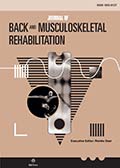Authors: Zemková, Erika | Kyselovičová, Ol'ga | Jeleň, Michal | Kováčiková, Zuzana | Ollé, Gábor | Řtefániková, Gabriela | Vilman, Tomáš | Baláž, Miroslav | Kurdiová, Timea | Ukropec, Jozef | Ukropcová, Barbara
Article Type:
Research Article
Abstract:
BACKGROUND: Contrary to static and dynamic balance, there is a lack of scientific evidence on the training induced changes in reactive balance control in response to unexpected perturbations in overweight and obese individuals. OBJECTIVE: This study evaluates the effect of 3 months of resistance and aerobic training programs on postural responses to unexpected perturbations under stable and unstable conditions in the overweight and obese. METHODS: A group of 17 overweight and obese subjects, divided into two groups, underwent either resistance or aerobic training for a period of 3 months (3 sessions per week).
…Prior to and after completing the training, they performed the load release balance test while standing on either a stable or unstable surface, with eyes open and closed. RESULTS: Peak posterior center of pressure (CoP) displacement, and the time to peak posterior CoP displacement during a bipedal stance on a foam surface with eyes open (17.3%, p = 0.019 and 15.4%, p = 0.029) and eyes closed (15.0%, p = 0.027 and 13.2%, p = 0.034), decreased significantly. In addition, the total anterior to posterior CoP displacement, and the time from peak anterior to peak posterior CoP displacement, both with eyes open (18.1%, p = 0.017 and 12.2%, p = 0.040) and eyes closed (16.3%, p = 0.023 and 11.7%, p = 0.044), also significantly decreased. However, after completing the resistance training, the parameters registered while standing on a stable platform, both with eyes open and closed, did not change significantly. The group that underwent an aerobic training also failed to show any significant changes in parameters of the load release balance test. CONCLUSION: Three months of resistance training in overweight and obese subjects improves reactive balance control in response to unexpected perturbations under unstable conditions, both with and without visual cues. Due to the fact that this unstable load release balance test was found to be sensitive in revealing post-training changes, it would be suitable for implementing in the functional diagnostic for this group, in addition to complementing existing testing methods.
Show more
Keywords: Center of pressure, obesity, perturbation, postural responses, resistance exercises
DOI: 10.3233/BMR-160585
Citation: Journal of Back and Musculoskeletal Rehabilitation,
vol. 30, no. 2, pp. 353-362, 2017
Price: EUR 27.50





